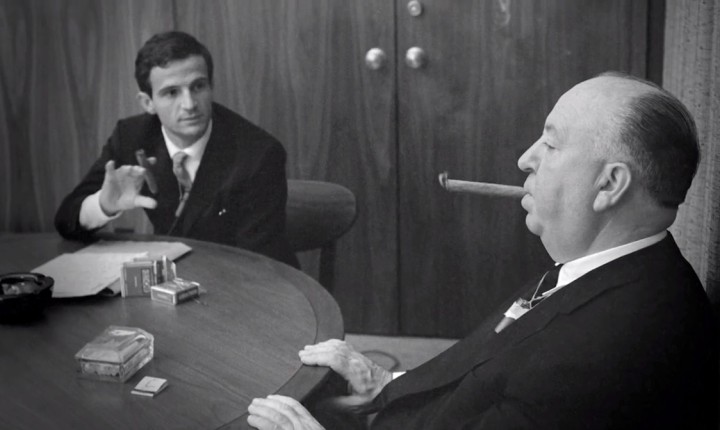“Hitchcock/Truffaut” (2015 release; 80 min.) is a documentary based on the book of the same name, originally published in 1966. The book was essentially a transcript of a week-long interview/conversation between directors Alfred Hitchcock and Francois Truffaut. The ambitious series of interviews took place in 1962 at the Beverly Hills Hotel.
Filmmakers discuss how Francois Truffaut’s 1966 book “Cinema According to Hitchcock” influenced their work.
It goes without saying that “Hitchcock/Truffaut” is one of the most influential — if not the most influential — film books ever published. When Alfred Hitchcock received the AFI Lifetime Achievement Award in 1980, François Truffaut himself described the famous text as “a cookbook full of recipes for making films.”
It is an essential companion to anyone who wants to get the most out of their journey through Hitchcock’s filmography.
Kent Jones’ doc on the groundbreaking interview book gets you drunk on Hitchcock’s films again. Nirvana for movie lovers – Peter Travers, Rolling Stone.
As the movie opens, we are given a quick historical context within which these conversations took place, and the various contemporaries (Martin Scorsese, Peter Bogdanovich, Paul Schrader, David Fincher, Wes Anderson, Richard Linklater, Olivier Assayas, and many others. etc.) provide their further perspectives.

This long interview was sound recorded, but apparently not entirely filmed. So, often we are watching a still while the words are given as voice-over. We see clips of great Hitchcock and Truffaut movies, but usually I couldn’t see the relationship between the words and the film clips. Also, Hitchcock spoke English, and Truffaut spoke French, so each was hearing the other person’s words through a interpreter.
Monsieur Hitchcock wavered between seeing himself as primarily entertainer or primarily artist but there is no doubt that he was most interested in connecting with and manipulating the emotions of the audience. So, in a sense he was above all a master of mass psychology –another point subtly and effectively made in this exceptional study of an exceptional film career.
Five Must Watch Video Essays for Alfred Hitchcock Fans
Hitchcock dies on April 29, 1980 at age 81, and most surprisingly Truffaut less than four years later, on October 21, 1984, at the untimely age of 52 of a brain tumor. Hitch’s career was over but Truffaut still had untold amounts of offerings in store. His book on Hitchcock and this film about the book and the man behind the book are now part of his deathless contribution to the history of Cinema. (source alexdeleonfilm)
Director Kent Jones really brings “the Bible of Cinema” to invigorating life. It is a wonderful opportunity to see the huge influence that Hitchcock had on the art of film making through the eyes of great contemporary directors.
“Truffaut/Truffaut” begins with a clip from a 1984 television appearance by Truffaut, during which he reflects on a passage from “Hitchcock/Truffaut.” Binotto then follows this with a sequence from Day for Night, Truffaut’s 1973 film about movies. In fewer than two minutes, the video essay reminds us once again that life imitates art.
To tell you more would spoil your viewing experience, you’ll just have to see it for yourself.
Watch the full film Hitchcock/Truffaut (2015)
Hitchcock’s Definition of Happiness
“Mr. Hitchcock, what is your definition of happiness?
A clear horizon — nothing to worry about on your plate, only things that are creative and not destructive… I can’t bear quarrelling, I can’t bear feelings between people — I think hatred is wasted energy, and it’s all non-productive. I’m very sensitive — a sharp word, said by a person, say, who has a temper, if they’re close to me, hurts me for days. I know we’re only human, we do go in for these various emotions, call them negative emotions, but when all these are removed and you can look forward and the road is clear ahead, and now you’re going to create something — I think that’s as happy as I’ll ever want to be.
Without elaborating further on the matter, one of the afterthoughts on the interview, Hitchcock’s idea of happiness is mainly general, albeit at the same time intimate –– Ideally, each person must find their own definition of happiness, or, as Kant recommended, stop looking for it in the first place.